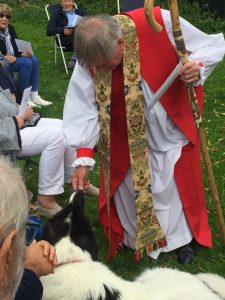Psalm 110
Of David. A psalm.
1 The Lord says to my lord:
“Sit at my right hand
until I make your enemies
a footstool for your feet.”
2 The Lord will extend your mighty sceptre from Zion, saying,
“Rule in the midst of your enemies!”
3 Your troops will be willing
on your day of battle.
Arrayed in holy splendour,
your young men will come to you
like dew from the morning’s womb.
4 The Lord has sworn
and will not change his mind:
“You are a priest forever,
in the order of Melchizedek.”
5 The Lord is at your right hand;
he will crush kings on the day of his wrath.
6 He will judge the nations, heaping up the dead
and crushing the rulers of the whole earth.
7 He will drink from a brook along the way,
and so he will lift his head high.
Matthew 22
34Hearing that Jesus had silenced the Sadducees, the Pharisees got together. 35One of them, an expert in the law, tested him with this question: 36“Teacher, which is the greatest commandment in the Law?”
37Jesus replied: “‘Love the Lord your God with all your heart and with all your soul and with all your mind.’ 38This is the first and greatest commandment. 39And the second is like it: ‘Love your neighbour as yourself.’ 40All the Law and the Prophets hang on these two commandments.”
41While the Pharisees were gathered together, Jesus asked them, 42“What do you think about the Messiah? Whose son is he?”
“The son of David,” they replied.
43He said to them, “How is it then that David, speaking by the Spirit, calls him ‘Lord’? For he says,
44“‘The Lord said to my Lord: “Sit at my right hand until I put your enemies under your feet.”’
45If then David calls him ‘Lord,’ how can he be his son?” 46No one could say a word in reply, and from that day on no one dared to ask him any more questions.
The Pharisees asked Jesus, “Teacher, which is the greatest commandment in the Law?”
Jesus replied, ‘Love the Lord your God with all your heart and with all your soul and with all your mind.’ This is the first and greatest commandment. And the second is like it: ‘Love your neighbour as yourself.”
The Pharisees were referring to the Law of Moses in the Old Testament where there are hundreds of religious laws. These laws define the Jewish way of life and identity. As there are over 600, it was thought useful to prioritise them. Pharisees, and Sadducees, Scribes, and Teachers of the Law, and the ordinary people in the street, all debated, ‘which is the greatest commandment?’ It was a contemporary controversy, one which the Pharisees hoped to draw Jesus into so that he would become entangled in the debate, and so lose the respect of at least some of the people.
Jesus gave them an answer from the Old Testament, his answer is a combination of Leviticus 9:18, “You shall not take vengeance or bear a grudge against any of your people, but you shall love your neighbour as yourself…,” and of Deuteronomy 6: 5, “You shall love the Lord your God with all your heart, and with all your soul, and with all your might.”
Jesus’ answer, the greatest commandment, is the basis of Christian morality. If you cannot reconcile your actions, or thoughts, or attitudes to Christ-like love of God and neighbour, then what you are doing is wrong. That’s the standard we hold ourselves to, and that’s the standard we fall short of daily.
But the greatest commandment is about about more than a moral code, it is about your relationship to God, and your relationship to others. In the Old Testament the nexus between the individual and God, and between the individual and others, was the law. In the New Testament the nexus is love. Although if you re-read the Old Testament with Jesus as your frame of reference, then it becomes clear, as it did to the Apostle Paul, that the same ethos lies behind both, it is just harder to see in the Old Testament. In the ‘greatest commandment’ Jesus does the work of drawing out the Christ-like from the Old Testament for us, and goes on to explain to the Pharisees that all the Law and the Prophets hang on these two commandments concerning love.
So do you ‘love the Lord your God with all your heart and with all your soul and with all your mind?’
I remember back in my mid-twenties being perplexed by the command to love God, how can you love something as abstract as God?
He is not very huggable.
I respected God, but I could not honestly say I loved Him.
So I prayed about it, I asked God to enable me to love Him.
It was around that time I realised I was in love with Jacqui. She had been brave and told me first, and that challenged me. I didn’t know how I felt. I had to go away and think about it. When I finally admitted to myself that I was in love, I resolved to tell her. I proposed to her one evening after church, leaning against the cooker as we were preparing dinner ( & that’s the standard of romance she’s had to put up with ever since)
Although loving God and loving a woman are very different matters, I think falling in love with Jacqui helped me to love God. In part because a heart once warmed is easier to warm again, but there is more to it than that. If ‘God is love’, as the bible tells us, that means God is the origin of all good and holy love. I often tell wedding couples that their love is a sign of God at work in our world. If you feel love, you have been touched by the hand of God.
Love flows from God into our lives, and we can allow that love to flow back to Him. That’s how God answered my prayer.
Or to put it another way, I did not find God very huggable, but I did find Jacqui huggable, and that manifestation of the love of God helped me to feel love for God, who is the source of all good and holy love.
I offer you my experience as a way of helping you to reflect on your love for God. If you cannot honestly say that you love God then pray as I did, and I am sure that you will find Him faithful.
I think it helps to know that in those moments when you feel that life giving, generous love, with your spouse, with your children, with your friends, those moments are revelations of the love of God, and of the nature of God.
Sceptics complain that as God cannot be seen, He must not be real. They don’t seem to have the same problem with understanding time, which cannot be seen, or gravity, which cannot be seen, but both of which can be experienced, and are fundamental human experiences.
Or love, which can not be seen, yet is incredibly powerful.
Some sceptics even deny the existence of love, as well God. ‘Let me see love, touch love,’ then I will believe in this faery tale!
Sometimes it takes a special person to make us believe in love, certainly you can’t really understand love until you have experienced it. And sometimes it takes a special person to make us believe in God. In the story of so many Christians is a person who enabled them to believe by embodying the love of God. Of course, it works the other way, so many sceptics I meet have in their story an experience of meeting a Christian who embodies the destructive power of the Kingdom of this World. Remember Christian, in every human encounter you are an Ambassador for the Kingdom of Heaven, a walking, talking, breathing testimony to the God you believe in.
The Disciple John, who had grown up with the understanding of God as law, wrote that “God is love,” what changed His understanding was his experience of being a disciple of Jesus. The invisible God had become touchable.
Jesus asked the Pharisees, “What do you think about the Messiah? Whose son is he?” Knowing their Old Testament, they replied, “The son of David.”
Then He said to them, “How is it then that David, speaking by the Spirit, calls him ‘Lord’? For he says, ‘The Lord said to my Lord: “Sit at my right hand until I put your enemies under your feet. ‘If then David calls him ‘Lord,’ how can he be his son?” He is quoting Psalm 110, that we heard in our first reading. If the Messiah is a Son of David, that is a descendent of David’s line, as Jesus was, why would David refer to him as my ‘Lord’?
“The LORD (that is in Hebrew, Yahweh) said to my Lord (that is Adonai)”
Yahweh, the name God described Himself by to Moses, and ‘Adonai’, which in the Old Testament is used to refer to God.
So David is saying that God said to God, (the Lord said to my Lord), sit at my right hand, you are a Priest for ever, I will extend your mighty sceptre from Zion…God talking to God? David has encountered the Trinity, the Father is speaking to the Son, the Messiah. That’s not an answer the Pharisees were going to give, but its the answer that changed the understanding of God in the hearts and minds of the disciples from Law to Love.
In Jesus God turned up in huggable form. Jesus is the great sacramental sign that makes the love of God visible.
Whether you love God a little, a lot, or not at all, we should all pray that God enable us to love Him with all our heart, soul and mind. we can study the gospels to get to know Jesus, we can recognise the love of God in our lives, and we can strive to love and serve others, and in doing these things we can fall more deeply in love with God.
Let me give you an example of how it works, a true story. Every Sunday, on his way to church, a man called in to see someone. That someone was a grumpy old curmudgeon who detested church and religion and the idea of God, but the man called in because he recognised his neighbour was lonely. After years of this that grumpy old curmudgeon said, ‘I’ll come to church with you today, not because I think you’re right, but because you have been good to me.’ Last I heard that grumpy old curmudgeon is now a Church Warden.
Amen.



